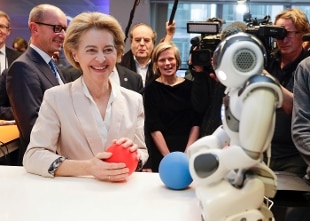- EU: draft digital package ready. Zuckerberg meets the commissioners in Brussels
- The Vatican brings together world experts for the ethics of artificial intelligence
- Mark Zuckerberg in Brussels: let's talk about taxes and regulations
- Web Tax, Zuckerberg ready to pay more taxes outside the US
- Google exceeds 1000 billion in value, it is the fourth US company
- The Pope meets Microsoft President Brad Smith: artificial intelligence and ethics
- Brad Smith at Rainews24: "Technology needs ethics and investment in training"
Share
by Celia Guimaraes February 19, 2020 Between the United States and China there is a third way for digital transformation , based on the values of openness, equity, diversity, democracy and trust.Bringing the EU - with its vision - to become a leader in the sector at a global level, attracting investments of € 20 billion over the next 10 years, is the aim of the document "Shaping Europe's digital future" presented in Brussels.
And for the President of the Commission, Ursula von der Leyen, it is a document that "covers everything from cyber security to critical infrastructures, from digital education to skills, from democracy to the media. I want digital Europe to reflect the best of Europe".
To boost 🇪🇺 AI, we want to attract more than € 20bn / year during the next 10 years. AI is all about data. To use it at large scale, we need to pool it. We'll create a single market for data in the🇪🇺 & want to trigger investments of € 4-6bn in EU data spaces & cloud infrastructures
- Ursula von der Leyen (@vonderleyen) February 19, 2020After President von del Leyen, it was up to Commissioners Margrethe Vestager and Thierry Breton to explain how to achieve the goals.
12 weeks of consultation
The 'White Paper' on AI will be open for public consultation (companies, unions, civil society, the governments of the 27 Member States) until May 19th. On the basis of the comments received, the Commission will decide on further actions for the "reliable" development of technology and data economy.
High-risk artificial intelligence systems, such as facial recognition, "should be transparent, traceable and ensure human control" in matters of health, police or transportation, says the White Paper, with stricter rules and guarantees on the risky applications of the emerging technology.
To be more explicit - it was explained in a press conference broadcast live also by the Italian headquarters of the Commission in Rome - the rules should protect citizens, for example, of what is required for cars, drugs, cosmetics and toys and the authorities " they should be able to test and certify the data used by the algorithms ", ensuring" respect for fundamental rights, in particular non-discrimination ".
It is not good or bad
"Artificial intelligence is not good or bad in itself: it all depends on why and how it is used. We allow the best possible use and control the risks that artificial intelligence can represent for our values - no harm, no discrimination! "Commission Vice President Margrethe Vestager wrote on Twitter, who has the power to digital and competition.
Artificial intelligence is not good or bad in itself: It all depends on why and how it is used. Let's enable the best possible use and control the risks that AI may pose to our values - no harm, no discrimination! #EUshapingDigital
- Margrethe Vestager (@vestager) February 19, 2020The starting point for the 'third European way' is there: the EU executive notes that Europe can count on centers of excellence on digital research, safe systems, on a solid position on robotics (25% of the total worldwide) and competitive industrial and tertiary sectors, ranging from automotive, energy, health, to agriculture. And that should attract investments, as well as create incentives to accelerate the spread of artificial intelligence also by small and medium-sized enterprises.
A war to be won
"Europe has certainly lost the war of personal data against the United States and China, but wants to win those of industrial data, that of the Internet of things thanks to the arrival of 5G," said the Commissioner for the Internal Market, Thierry Breton, who later specified that European rules could arrive within eight months.
Breton also stressed, regarding the responsibility of Big Tech on the use of data and the publication of content , that "we are starting a dialogue with the big platforms", adding that we prefer "always shared governance" even if at the moment "nothing it's decided, but time is running. ”In fact, Facebook CEO Mark Zuckerberg went to Brussels this week, while Sundar Pichai, CEO of Alphabet, Google's parent company, and even before Brad Smith, Microsoft resident.
Matter of money
It remains to be seen how much the budget under discussion in Brussels will affect the necessary resources. It has been observed in Rome that EU requests are much higher than what the 27 Member States are willing to pay. The gap, according to EU sources, would be 230 billion euros, 60 billion of which fell due to the exit of the United Kingdom.

